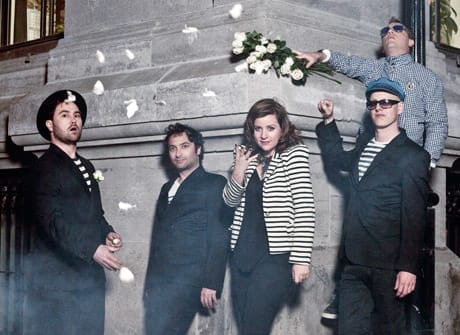After ten years, Montreal-based pop-rock group Stars have come full circle back to their indie roots, having departed long-time label Arts & Crafts last year to forge their own, cultivating a love-hate relationship with the internet, and releasing a new album, The Five Ghosts. "It was an unbelievably tense and heavy year," Torquil Campbell, Stars co-lead singer, admits. "My dad died and I had a child. It was a huge, huge painful time for the whole band. But there was also a lot of beauty and it brought a lot of closeness between us. [At its heart], Stars have always seen themselves as a sad dance band. The Five Ghosts feels like a return to the core of what we want to be writing about."
The album is a tightly condensed package: most songs ring in around the three-minute mark, and the vibe is definitely one of dancing in the dark, from the exquisitely bleak call-and-answer between Campbell and co-lead singer Amy Millan on "Dead Hearts" to the floating enchantment of "He Dreams He's Awake." The imagery throughout evokes something macabre but Campbell maintains that there's a difference between writing about the darkness and feeling sad.
"To some degree on my part, it's a cop-out," Campbell admits. "It's a lot easier to write about the scary things or the macabre things then it is to write about happiness. Happiness is a very simple and selfish state and when you feel it, you don't really want to share it."
One thing he's eager to share, though, are his views on why Stars' 10th anniversary was the time to go independent again. "It's the end of the music industry as we know it," Campbell says. "As soon as you get in touch with your fans, you can have a direct relationship with them through the internet. For most bands in our position, who don't sell tons of records but who have fans around the world, it's kind of the perfect model: rein it in and make sure every aspect of it is what you want it to be. It's just simple business in a way."
It's simple business now, but consider that within Stars' decade together the iPod debuted, YouTube made Justin Bieber a star, and digital distribution drove Tower Records, and countless others, to extinction. For better or worse, the internet's changed everything, not least the rise of social media.
At the end of April, Campbell had a mild exchange of words, online, with Fucked Up's Damian Abraham, sparked by Campbell's Twitter declaration that Stars plan on boycotting Arizona following the passing of the controversial Bill 1070, which allows law enforcement officers to demand people provide proof of citizenship at random checks. The media picked up the non-story and had a frenzy with it. Two months later, Campbell's quick to point out there was never a fight, but he does feel there's something dark and depressing about the way people approach social media.
"The internet has had this strange way of chilling free thought," Campbell says. "It depresses me, because I think rock'n'roll should be political. I want kids to get excited and be galvanized by what matters to them. Whether it's Arizona or gay bashing, whatever it is they think is unjust, use that media to speak against the people who want to intimidate you."
The album is a tightly condensed package: most songs ring in around the three-minute mark, and the vibe is definitely one of dancing in the dark, from the exquisitely bleak call-and-answer between Campbell and co-lead singer Amy Millan on "Dead Hearts" to the floating enchantment of "He Dreams He's Awake." The imagery throughout evokes something macabre but Campbell maintains that there's a difference between writing about the darkness and feeling sad.
"To some degree on my part, it's a cop-out," Campbell admits. "It's a lot easier to write about the scary things or the macabre things then it is to write about happiness. Happiness is a very simple and selfish state and when you feel it, you don't really want to share it."
One thing he's eager to share, though, are his views on why Stars' 10th anniversary was the time to go independent again. "It's the end of the music industry as we know it," Campbell says. "As soon as you get in touch with your fans, you can have a direct relationship with them through the internet. For most bands in our position, who don't sell tons of records but who have fans around the world, it's kind of the perfect model: rein it in and make sure every aspect of it is what you want it to be. It's just simple business in a way."
It's simple business now, but consider that within Stars' decade together the iPod debuted, YouTube made Justin Bieber a star, and digital distribution drove Tower Records, and countless others, to extinction. For better or worse, the internet's changed everything, not least the rise of social media.
At the end of April, Campbell had a mild exchange of words, online, with Fucked Up's Damian Abraham, sparked by Campbell's Twitter declaration that Stars plan on boycotting Arizona following the passing of the controversial Bill 1070, which allows law enforcement officers to demand people provide proof of citizenship at random checks. The media picked up the non-story and had a frenzy with it. Two months later, Campbell's quick to point out there was never a fight, but he does feel there's something dark and depressing about the way people approach social media.
"The internet has had this strange way of chilling free thought," Campbell says. "It depresses me, because I think rock'n'roll should be political. I want kids to get excited and be galvanized by what matters to them. Whether it's Arizona or gay bashing, whatever it is they think is unjust, use that media to speak against the people who want to intimidate you."
